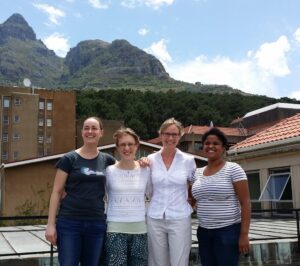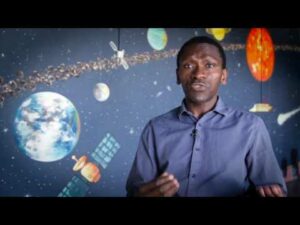SALT Visits/Scholarships: Apply now!

Previous SALT-Stobie scholars: Retha Pretorius (Marie-Curie and Newton advanced fellow, now astronomer at SAAO), Elmé Breedt (research positions at Warwick University and now astronomer at the University of Cambridge), Vanessa McBride (UCT Adj. Associate Professor, Head of research at SAAO, and IAU OAD astronomer) and Tana Joseph (Fulbright and Newton fellow, now astronomer at University of Amsterdam). [Image credit: Elmé Breedt]
To ensure maximum benefit from our continued investment in SALT, for astronomy and its broader impact on areas such as technology, engineering, data science, the NRF has provided funding for a programme to support research visits for students, postdoctoral fellows and early career researchers (hereafter referred to as “participants”) from SA to spend time at SALT partner institutes.

Previous SALT-Stobie Scholar: Lerothodi Leeuw (MIT Buchard Scholar, NASA research fellow, UNISA Professor and now Professor at UWC). [Image credit: NRF video from 2016 Hamilton Naki Award]
The envisioned scheme aims to
- support/build scientific collaborations and networks for participants and their hosts;
- give participants international exposure and opportunities for specialized training and research;
- give SALT partners the opportunity to work with exceptional students and postdocs;
- further strengthen the SALT partnership (a “whole that is greater than the sum of its parts”)
Proposed projects: See the table below for a list of potential projects for research visits. Researchers at any SALT partner institution may offer further project opportunities at any time. To add a project, hosts should send in a project title and brief project description (see the examples below) to scholarshipsandvisits@salt.ac.za. Further information may be requested. To remove or make changes to a project listing, please also email scholarshipsandvisits@salt.ac.za.
Selection/eligibility: The focus will be on SALT and SALT-related projects including instrumentation, activities linked to the Vera C. Rubin Observatory, optical-radio synergies, theory/computation, and/or data science.
- Available funding, costs, and partner contributions will determine the number and duration of participant visits/positions that can be supported.
- Partners should contribute to local costs, such as accommodation, visa costs etc., either directly or by leveraging existing funding instruments.
- Selection of participants will be in line with NRF employment equity considerations.
- For visits, participants enrolled or employed at a South African university or institution are eligible.
- MSc/PhD scholarship and postdoctoral fellowship positions are only open to South African citizens and permanent residents.
- A strong proposal will involve exceptional participants, clear and compelling scientific goals, evidence of thorough preparation for visits, excellent host support and infrastructure, and specific, measurable outcomes, e.g., MSc/doctoral degree, publications, skills transfer, collaborations etc.
How to apply: Participants should contact potential hosts directly to discuss the application. It is recommended that this be done early as it is necessary to prepare the application. It is possible to apply for visits with SALT partners that are not currently listed here; please contact them directly to work out a project plan.
A complete application will include:
- An application form available HERE which includes a detailed motivation, budget and project plan, goals, and expected outcomes
- Letter from the host confirming the project plan, dates, and any support/funding contribution
- Letter from participant’s current supervisor agreeing to the planned visit (if applicable)
Current deadline: All application materials should be submitted as a single pdf to scholarshipsandvisits@salt.ac.za by 21 March 2025.
Visits:
Project topic |
Host/s |
Level |
|---|---|---|
| Discovery and Characterization of Cataclysmic Variables with LSST and SALT Spectroscopy | Anupam Bhardwaj, IUCAA anupam.bhardwaj@iucaa.in | PhD, Postdoc |
| The multiphase ISM in infrared-luminous galaxies | Andrew Baker, Rutgers University ajbaker@physics.rutgers.edu | MSc, PhD |
| The effects of environment on galaxies’ neutral atomic gas reservoirs | Andrew Baker, Rutgers University ajbaker@physics.rutgers.edu | MSc, PhD |
| Radial-Velocity measurements of Blue Large Amplitude Pulsators (BLAPs) | Simon Jeffery, Armagh Observatory simon.jeffery@armagh.ac.uk | MSc, PhD |

